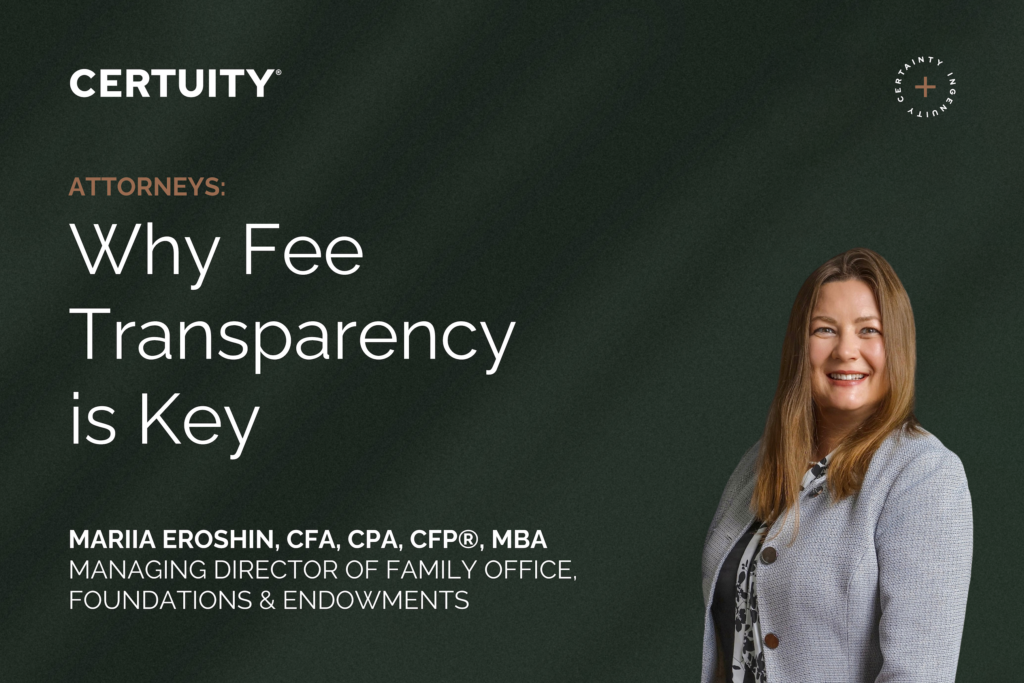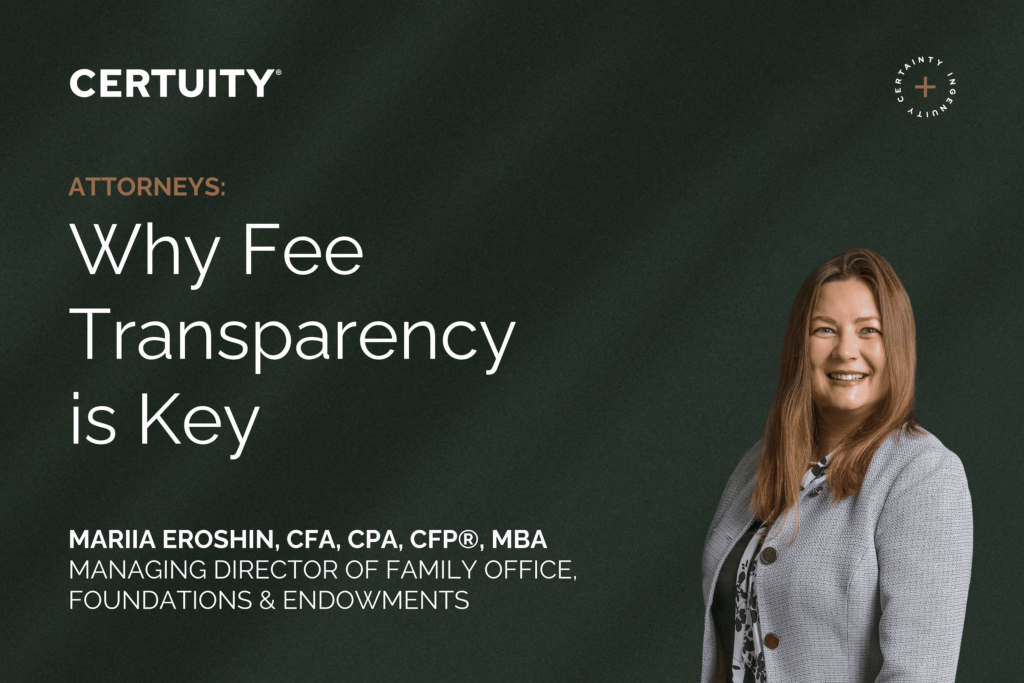

Attorneys are well known for paying close attention to the “fine print” and reading “between the lines.” That discipline is honed over years of practice and serves them well in most instances.
Still, it can be difficult for even the most skilled attorney to make sense of all the fees (transparent and hidden) that many wealth management firms charge their clients. It goes without saying that financial compensation has the potential to align interests…or create adverse incentives.
Attorneys would be wise to inquire as to whether or not some financial institutions, private banks, wirehouses or broker dealers truly have their best interests at heart, or whether they might just be “pushing products” to collect additional fees.
We recently connected with Mariia Eroshin, CFA, CPA, CFP®, MBA, Managing Director of Family Office, Foundations and Endowments at Certuity. Below, she shares what attorneys can do to ensure the fees they are charged are fair and transparent so they feel confident their financial advisors are truly on their side.
Ms. Eroshin, can you define what you mean by fee transparency in wealth management?
Fee transparency in working with a wealth management firm seems like it should be straightforward, but too often it is anything but.
That being the case, attorneys should only work with investment advisors who explicitly outline all fees, charges and any potential additional costs that their clients may incur. This includes management fees, performance fees, transaction costs and any other expenses related to the overall management of a client’s investment portfolio.
It is especially important to view fees through the lens of conflicts of interests and misaligned incentives. For example, fees should be received only from clients, and not from investment funds or products. Receiving compensation from one investment fund and not another could imply an incentive to promote a fee-paying investment.
Personally, my sole source of compensation with Certuity is derived only from my clients, and not from any third-party managers. That’s it. I firmly believe in being part of a fee-only wealth management firm as my fiduciary responsibility legally requires me to act in the best interests of my clients.
I advise any attorney to only work with true fiduciaries who are transparent about fees without any hesitation. Only then can a long-term relationship founded on trust and confidence be built.
Why is this of particular importance to attorneys?
As stated above, transparency is crucial for building trust. As attorneys are typically laser-focused on working with an advisor who does not have conflicts of interest and is able to provide unbiased, professional advice, transparency around fees is paramount.
An attorney deserves to have a clear understanding of how his or her advisor is compensated, what services are included in the fees and any potential additional costs. This transparency allows for informed decisions to be made without any “second guessing” as to why an advisor recommends an investment. Clarity in compensation structure also ensures that the client receives fair value for the fees paid.
What are some of the fees attorneys should look out for?
First, look out for fees associated with certain products. In the wealth management industry, financial advisors at some financial institutions, banks, insurance companies or brokerages may be incentivized to promote specific proprietary products or services (such as their own mutual funds, insurance products, wrap free programs, etc.) to clients in exchange for commissions and/or fees.
In addition, advisors may receive additional compensation related to mortgage lending, life insurance, long-term care insurance or other products that have a financial element. When these products are directly linked to an advisor’s compensation, it can create an inherent conflict of interest that has the potential to put a client at financial risk.
Second, ask how trades are executed and whether there are any bid-ask spreads commissions that are taken out. The bid-ask spread is the difference between the price that an investment can be bought or sold at. In the labyrinth of fees, this bid-ask spread difference effectively acts as a brokerage fee or commission for executing the trade. This is very common at wirehouses.
The reality is that it is more difficult than one may think to find a trusted financial advisor who acts as a fiduciary, which again, legally obliges that person to act in your best interests.
This underscores the importance of taking time to research the qualifications, experience and track record of potential advisors to find one who understands your goals and objectives and is able to implement a plan that meets or exceeds them – always with your best interests as the primary concern.
How are fees sometimes masked or otherwise hidden?
Sometimes big brokerage firms and banks may hesitate to provide their wealth management clients with complete fee transparency, as their compensation structures are highly and intricately complex and different “programs” might compel them to obfuscate the real costs to clients.
Additionally, some of these businesses, or their parent organizations, may not be solely focused on providing fee-only investment advice, which presents conflicts of interest that are often not addressed openly but more likely footnoted and disclosed as minimally as required.
Some of these firms might have entire businesses as securities brokers, investment banks, custodians, lenders and as distribution or placement agents for other investment management groups, which creates pressure for advisors to “promote and push” wealth management clients into those businesses.
The advice received from a wealth manager at these types of firms must always be thought of through the lens of, “How does this advice impact (or profit) other parts of their business?”
What are some red flags that a firm (or advisor) is not being transparent in disclosing fees?
When you check Form ADV 2A of an advisor, which is the uniform form used by investment advisors to register with the SEC and state securities authorities, and find fees listed that haven’t been disclosed to you, that’s a red flag.
As discussed above, it can be difficult to assess investment management fees paid to outside firms, such as a bank or fund or private equity firm, in addition to your stated advisory fee.
In most cases, advisors receive some amount of the fees paid to these outside entities, with certain “affiliated groups” allowing them to get bigger amounts or shares of those fees than had they selected other fund managers. No surprise, this could invite the potential for adverse investment selection, even amongst non-proprietary or third-party investment options.
What are some specific questions someone should ask an advisor related to fee disclosure?
Below are the questions I strongly encourage any attorney to ask of a potential wealth manager. If you don’t receive responses that are unequivocal and transparent, it’s best to keep looking:
- Are you a fiduciary? If an advisor is not a fiduciary, that person is not legally obligated to act in your best interests. In that case, it’s best to find another advisor.
- How are you compensated? An advisor’s only source of compensation should be the fees paid directly by the client. Any other source of compensation can create a conflict of interest.
- Do you work for a fee, a commission or both? Again, the best advisors will provide fee-only wealth management.
- Do I pay you, or are you paid based upon what I invest my money in? For example, mutual funds, stocks, bonds and alternative investments.
- What professional designations do you hold? Advisors who hold professional designations, such as a CFP®, CFA and CPA, generally have to comply with additional rigorous ethical and disclosure requirements due to their professional designations. Most of these financial industry certifications require their own compliance with strict codes of ethics and compensation transparency requirements. Moreover, certified advisors have to take continuous education in ethics and pass exams on a regular basis.
Lastly, be sure to ask for references!
To further explore the importance of fee transparency and working with a financial advisor who is a fiduciary, please contact Mariia Eroshin at meroshin@certuity.com.